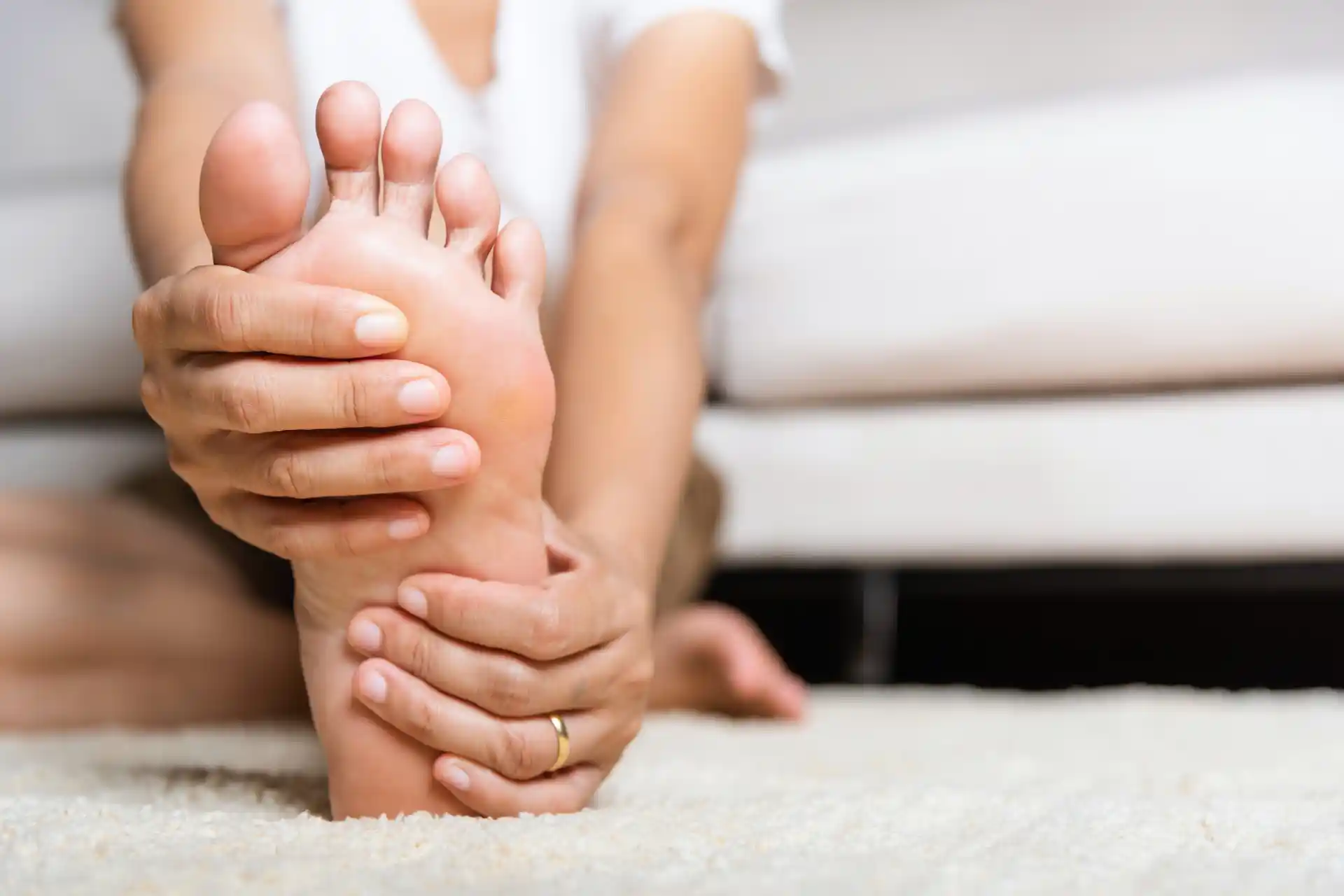Recognize Foot Numbness
If you have ever asked yourself, “is foot numbness dangerous?” you are not alone. Foot numbness feels like pins and needles or a loss of sensation in part of your foot.
Foot numbness may be temporary or it could stem from chronic conditions like diabetes or sciatica (Healthline).
Good news, you can take steps to understand and manage it before it becomes more serious.
Explore Common Causes
Foot numbness happens because signals traveling through your nerves do not reach your brain correctly, or your brain does not process them the way it should. Some people only notice this numbness at night, while others feel it all day.
You might sense burning, tingling, or weakness in your foot. Either way, it is your body’s way of communicating there may be an underlying cause worth investigating.
- Diabetes
High blood sugar levels can damage nerves over time, resulting in numbness or tingling. This is a primary symptom of diabetic neuropathy. If you have diabetes, you may notice gradual changes in feeling or recurring foot infections. Experts at Healthline advise seeking medical input if you have diabetes and develop numbness (Healthline). - Sciatica and Nerve Entrapments
A compressed nerve, whether due to sciatica or an issue like nerve entrapment, can reduce sensation in one or both feet. Sciatica originates in your lower back and travels down the leg. If that nerve is irritated, you might feel numbness, pain, or weakness behind your thigh and into your foot. - Prolonged Pressure
Crossing your legs, wearing tight shoes, or standing on hard surfaces for extended periods can slow blood flow and compress nerves. Sometimes alleviating that pressure is all it takes to regain normal sensation. - Peripheral Neuropathy
Nerves outside your central nervous system can become damaged or diseased, causing numbness and other symptoms in your feet. Peripheral neuropathy can arise from a range of triggers, including autoimmune conditions, infections, and inherited disorders (Mayo Clinic). - Blood Vessel Issues
Conditions that narrow or block blood vessels may inhibit circulation to your feet. When blood flow is limited, your tissues, including nerves, receive fewer nutrients and less oxygen, prompting symptoms such as numbness.
Understand Potential Dangers
Foot numbness itself is not always worrisome, but ignoring it can lead to complications. The danger is not usually the numbness alone; it is the risk that comes with reduced sensation and neglected underlying causes.
- Injuries and Infections
Numbness reduces your ability to feel pain or discomfort. You could develop blisters, cuts, or even a foot ulcer without realizing it. A foot ulcer, especially if linked to diabetes, can become infected and in severe instances lead to gangrene or amputation (NHS). - Falls and Accidents
When you cannot fully sense where your foot lands, you might stumble more often. The Cleveland Clinic emphasizes that balance challenges can become serious, especially for older individuals or anyone with mobility concerns (Cleveland Clinic). - Possible Cardiovascular Strain
Severe forms of peripheral neuropathy sometimes affect heart and blood pressure regulation (NHS). Although this is less common, it can have far-reaching effects if unaddressed. - Progressive Nerve Damage
If an underlying cause (like high blood sugar) is not managed, your nerve health may decline. Over time, that could escalate from mild tingling to persistent numbness, interfering significantly with your daily routines.
Good news, you have a lot of options for prevention and treatment. Seeking care early not only helps protect you from painful wounds but also preserves your mobility.
Know When To Seek Help
Early diagnosis and treatment give you a better chance of controlling symptoms and minimizing nerve damage (Mayo Clinic). Here are specific clues that it is time to see a doctor or podiatrist:
- Persistent or Worsening Numbness
If the numbness lingers, spread beyond the foot, or grows more intense, do not wait. Consistent numbness may indicate an underlying issue like nerve pain, peripheral artery disease, or even an autoimmune condition. - Diabetes-Related Issues
If you have diabetes, numbness in your feet calls for prompt evaluation. This is because high blood sugar can steadily erode nerve function. Diagnosing diabetic neuropathy early can help keep your feet healthier. - Difficulty Breathing or Weakness
If your foot numbness arrives suddenly with symptoms such as trouble catching your breath, chest pain, vertigo, or significant weakness, it may signal a serious problem. Healthline warns that sometimes numbness with breathing issues can be an early sign of a stroke or, in rare cases, a heart attack (Healthline). - Loss of Balance or Frequent Falls
If you find yourself stumbling more often than usual, or your balance feels off, talk to your doctor. A physical therapist can develop a fall-prevention plan, including exercises to strengthen your legs, ankles, and feet. - Ulcers or Persistent Sores
Changes in skin appearance, slow-healing wounds, or open ulcers on your foot deserve immediate attention. This is crucial for anyone with diabetes or peripheral vascular disease, but it can affect others as well.
Try Common Relief Methods
Treating numbness begins with identifying and managing the root cause, whether that is diabetic complications, nerve compression, or a blood flow problem.
You can also take steps at home to ease symptoms, improve your comfort, and support healing:
Manage Underlying Conditions
- Regulate Blood Sugar
If you have diabetes, proper blood sugar control is essential. This may involve medication, dietary adjustments, or working with a dietitian. Maintaining stable glucose levels helps protect your nerves from ongoing damage. - Address Compression
If tight shoes or repetitive movements are compressing your nerves, switch up your footwear or adjust sitting positions. A supportive shoe with room at the toes can ease pressure. You might also experiment with changing your posture at work. - Explore Therapy Options
Physical therapy often focuses on exercises that boost balance and strength in your legs and feet. If your numbness stems from sciatica or back issues, a physical therapist can show you stretches to reduce nerve irritation.
To learn more about other nerve-related conditions, check out our articles on nerve compression, sciatica, hip impingement, and carpal tunnel syndrome.
Improve Your Circulation
- Stay Active
Low-impact activities like swimming and light walking can promote blood flow. Even 15 minutes of easy, regular exercise per day reduces stress hormones, so movement can help more than just circulation. - Avoid Long Periods of Standing or Sitting
Alternate between sitting and standing to keep blood moving. If you work at a desk, consider gentle foot exercises every hour. Point and flex your feet under your desk, or walk around for a minute or two to relieve pressure. - Maintain a Healthy Weight
Extra pounds can place stress on your legs and feet, which may worsen circulation issues. Even modest weight loss can help reduce pressure on weight-bearing nerves.
Consider Medications or Medical Procedures
Your doctor or specialist may suggest:
- Nerve Pain Medications: Drugs like gabapentin or certain antidepressants can ease tingling, burning, or painful numbness. They may cause mild side effects such as drowsiness or dizziness, so follow your doctor’s guidance.
- Topical Treatments: Lidocaine creams or patches can temporarily soothe irritated nerves. You can apply these directly to the painful or numb areas, but watch for skin irritation.
- Evaluations Like A Nerve Conduction Study: A nerve conduction study measures how quickly impulses travel through your nerves. Slow speeds can help confirm peripheral neuropathy or locate nerve blocks (Mayo Clinic).
Good news, most people see improvement if they catch and treat the cause early. Set realistic goals with your healthcare provider and track progress over time.
Protect Yourself From Further Harm
One of the biggest dangers of numb feet is that you might injure yourself without even knowing it. Foot awareness, regular checks, and protective measures go a long way in preventing complications.
- Perform Daily Foot Checks
Look for cuts, sores, blisters, calluses, or swelling. If you spot anything unusual, address it right away. In particular, watch for foot ulcers if you have diabetes or blood vessel problems. Early care prevents infections that can escalate quickly. - Wear Proper Footwear
Consider shoes with cushioned soles and enough space around the toes. Snug, pointy shoes can worsen numbness or lead to other foot issues. Orthotic inserts can help correct foot alignment and balance if recommended by a podiatrist. - Keep Moisture Balanced
Dry, cracked feet are more prone to injuries. Moisturize daily, but avoid leaving your feet overly damp, as that can encourage fungal infections. If you notice persistent dryness or open cracks, consult a health professional. - Practice Safe Grooming
Trim your toenails straight across to avoid ingrown nails. If you have trouble seeing or feeling well in your feet, ask for help from a friend, family member, or foot-care specialist. - Revisit Your Activity Routine
If neuropathy or numbness discourages you from being active, ask a physical therapist for a tailored plan. This might prevent any abrupt, high-impact workout that could inflame nerves or joints.
Plan Your Next Steps
Foot numbness is not always a red flag, but it can signal something more serious if it lingers or goes unchecked. The more you know about potential causes, treatments, and prevention, the better prepared you will be to keep your feet healthy and functional.
Here is a quick recap of how you can move forward:
- Monitor Your Symptoms
Track your episodes of numbness by frequency, duration, and whether you notice other issues such as tingling or weakness. Jotting down these patterns helps your healthcare provider zero in on a diagnosis. - Get Professional Advice
Do not hesitate to reach out to a doctor or specialist if you have any concerns. Sometimes you will need tests like an EMG or a nerve conduction study. If lab work does not indicate underlying conditions, your doctor may suggest watchful waiting, but this is best confirmed by a thorough evaluation. - Take Steps to Prevent Injuries
Check your feet each day, wear shoes that fit properly, and stay aware of your surroundings to lower your risk of falls. If you have nerve problems, consider adding a balance practice to your weekly routine. - Mind Your Overall Health
Keep an eye on your diet, stay active, and manage conditions like diabetes or high blood pressure. If you need help with nerve-related concerns beyond foot numbness, explore neuropathy treatment options with your healthcare team. - Adapt and Adjust
Small changes in your lifestyle, footwear, and daily habits can yield significant improvements. Stay open to trying different pain management solutions, physical therapy, or other recommended treatments.
Your feet support you through every step of your day. When they lose sensation, they are calling for extra care. Paying attention now can prevent deeper problems down the road and keep you moving comfortably for years to come.
If you ever find yourself wondering again, “is foot numbness dangerous?”, remember that prompt action and professional guidance often make all the difference.
Seek RELIEF®
RELIEF® is a science-backed treatment that targets dysfunctional fascia, which may contribute to nerve irritation and peripheral neuropathy.
Using a gentle technique called hydrodissection, RELIEF® releases adhered fascia and soft tissue that can press on nerves—helping reduce tingling, burning, numbness, and pain associated with nerve pain and other peripheral neuropathy conditions.1-7
RELIEF® is a minimally invasive alternative to traditional treatments and does not require steroids, long-term medication, surgery, anesthesia, or post-procedure immobilization.
If you’re in the Miami area and seeking relief from peripheral neuropathy, contact us today to schedule a consultation.



.jpg)


.svg)